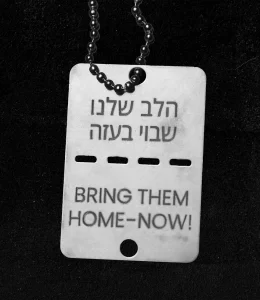We approach Shabbat with heavy hearts, mourning the loss of two young people, Sarah and Yaron.
Sophie Milman performs Eli, Eli, the poem of Hannah Senesh. May we find peace this Shabbat, for us and everyone.
Shabbat Shalom
#BringThemHomeNow
We approach Shabbat with heavy hearts, mourning the loss of two young people, Sarah and Yaron.
Sophie Milman performs Eli, Eli, the poem of Hannah Senesh. May we find peace this Shabbat, for us and everyone.
Shabbat Shalom
#BringThemHomeNow
We mourn the tragic deaths of Sarah Milgrim and Yaron Lischinsky
murdered outside last night’s AJC event.

On the checkboard of foreign policy, we are careening to a terrible end.
Hamas’ delay of the planned hostage release this week, combined with the horrible physical condition of the returned hostages, outraged Trump to set a Saturday deadline for the return of all hostages or else. Netanyahu, already under internal pressure, has now threatened the resumption of brutal war in Gaza. This leaves two options for Hamas: capitulate to the threats or defy them. Defiance likely would be killing some or all of the hostages.
Although Hamas does not respect human life, sending the message of defiance is the only opportunity to demonstrate resilience and, in the opinions of many, victory. The hostages and the Palestinians will be readily sacrificed in the name of ideology.
This is a dangerous game, ultimately without winners, only losers. Hopefully, leaders will step forward to pull back from the precipice. This requires courage, a bold vision for moving forward, and the support of countries genuinely interested in peace.
 One of the horrors of the current war is the holding of the hostages. Their predicament is hopeless because their freedom depends on some level of trust, and there is no trust.
One of the horrors of the current war is the holding of the hostages. Their predicament is hopeless because their freedom depends on some level of trust, and there is no trust.
Israel and Hamas are avowed enemies. Each is dedicated to the destruction of the other. There is no middle ground, no reconciliation, no peace. With this at each core, trust cannot exist.
Hamas has fully embraced the “civilian as a weapon” idea. To give up the hostages means giving up one of its most potent weapons. The hostages have been used as shields, and many believed as a bargaining chip. But without trust, there is no incentive to use this bargaining chip, and once it is used, nothing is left. Hamas does not trust that Israel will live by an agreement; they believe Israel sees an agreement as only the means to obtaining the release of the hostages, nothing more. Once the hostages are returned, Israel will continue to prosecute the war.
Israel has displayed its commitment to destroying Hamas. As Hamas cannot be appeased, it must be eliminated. Israel has a long memory and believes in retribution. It does not trust Hamas. Israel thought it could permit Hamas to exist as it did not pose an existential threat and accepted a tenuous ceasefire. Then, October 7 happened, and whatever trust existed was shattered.
A ceasefire is a lull until it ends, and the warring begins again. This is part of the cynical lack of trust, but it is one of the few things both sides can agree upon.
War is usually fought to capitulation. One side is defeated unequivocally. The victor then dictates the terms of surrender and peace over the vanquished. This may not be possible. But until these two warring parties have more to gain by ceasing hostilities and learning to co-exist, the death and destruction will continue.
I pray that the current negotiations might prove me wrong and that the hostages will be returned. And perhaps peace might be seen as an alternative to hatred and carnage.
I was sitting with someone recently. He is a Muslim and active in the causes of his people. I am a Jew and active in the causes of my people. We are part of a dialogue group that builds bridges and develops relationships with people we usually do not get to know. But we are engaged, and through this process, a friendship has ensued.
The war in the Middle East is deeply painful for us both. We both know people we deeply care about who are direct victims of this war.
My friend recently celebrated the birth of his child. Mom and baby are doing well. He is so excited to be a father. Like most fathers, he wants to provide for his family and nurture his child with love and a bright future filled with opportunities. I recently celebrated the birth of a grandchild. We are overjoyed to have a new addition to our family and cannot wait for the next opportunity to shower our love. But in this beautiful moment was something chilling; it was an epiphany of sorts. How different would this be if we did not all live here.
If the war between our people never ends, what would become of our children? With the birth certificate, effectively, a death warrant would have been issued as well. Whether warriors or innocent victims, they would be the fodder for hostilities between two warring nations; we bring them into a killing machine. Birth should represent hope- the idea that there is a future and tomorrow promises something good. We do not have children so that they may be offered up, sacrificed on an altar of hate.
My friend and I shudder at this, as do many other mothers and fathers here and there. Birth is a miracle, and peace is no less. It is time to find a path forward together.
We are heartbroken at the news of the murder of the six hostages, Eden Yerushalmi, Hirsch Goldberg Polin, Ori Danino, Carmel Gat, Alexander Lobanov, and Almog Sururi.
In our grief, there is sorrow and anger. In this moment, let us sit in the pain and pray for them.
Blessed is the true judge.
Another week of anxious anticipation. In Israel, it is peaceful but tense as the Iranian reprisal waits for its moment.
Israelis traditionally use the phrase ‘Laila Tov’ to wish each other a peaceful and restful night.
Many have started using the phrase ‘Laila Shaket,’ wishing for a quiet night.
May this Shabbat be quiet and good and of Peace.
Shabbat Shalom
To all of my friends and family in Israel, I wish you safety.
We all understand the certainty of this uncertain situation. Iran’s response to the Haniyeh assassination could be on Tisha B’Av, or it could be tomorrow, but regardless of the date, it will be.
May you be protected by the IDF and all the defensive systems. May the United States stand shoulder to shoulder, and may many others seeking to limit the destruction also step into the breach.
This is a difficult time, and I wish I could do more than pray, but that is what I have to offer for now.
Chazak v’umatz
May the Divine spread Your canopy of Peace over us, over all the people Israel, and over Jerusalem
Baruch atah Adonai, ha-poreis sukkat shalom aleinu v’al kol amo Yisrael, v’al Yerushalayim
Israel made it clear that it was prepared to engage in a broader war. Targeted attacks, particularly the one that assassinated Haniyeh in Tehran, sent an unambiguous message.
The recent barrage from Iran in the conflict’s latest phase serves as a stark reminder that Iran and its allies are equally committed to intensifying the fight.
We sit on the edge. The words of reprisal portend a substantial response intended to be punishing.
Despite the current turmoil, the potential for peace is not lost. Coexistence, though distant, is not unattainable.
As we enter Shabbat, let us find solace in this sacred moment and fervently pray for the peace of Shabbat to soon embrace us all.
Shabbat Shalom
This is the mantra we need to keep repeating in every conversation. Our people must be brought home as the basis for any negotiation.
Many hostages have perished, all have endured unspeakable suffering, and we presume those still alive continue to be abused. This is the moral basis for the continued war on Hamas.
Although Hamas does not care about the killing and destruction inflicted on the Palestinian people and crudely, cynically positions the hostages and the Palestinians as bargaining chips in political maneuvering, we care about them and will continue to fight against the forces of barbarism until our people come home.
I pray for peace, and I pray for the end to the pain and suffering. Bring them home, and then we can take steps toward ending hostilities.